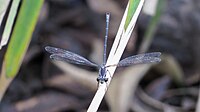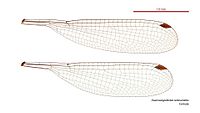Common flatwing
| Common flatwing | |
|---|---|

| |
| Male | |

| |
| Female | |
| Scientific classification | |
| Domain: | Eukaryota |
| Kingdom: | Animalia |
| Phylum: | Arthropoda |
| Class: | Insecta |
| Order: | Odonata |
| Suborder: | Zygoptera |
| Family: | Argiolestidae |
| Genus: | Austroargiolestes |
| Species: | A. icteromelas
|
| Binomial name | |
| Austroargiolestes icteromelas | |

| |
The common flatwing (Austroargiolestes icteromelas) is a very common species of damselfly of the subfamily Argiolestinae in the family Argiolestidae.[3][4] It is also known as an Australian flatwing.
Both male and female common flatwings look similar, with a long and slender body about 43 mm in length, and a bright metallic-blue colour. They usually rest with their wings flat open, but females sometimes rest with wings folded up. Their antennae are very small, and their compound eyes are comparatively large. Common flatwings do not use their legs for walking, but for capturing other flying insects in the air, like all other dragonflies and damselflies. They can be found along streams and creeks, are seldom found near still water ponds, but are more likely to be found near slow running water. This species likes to rest within a few metres of a creek or stream, in a shaded area, sometimes resting in large groups among plants. They perch on leaves and, when disturbed, fly a short distance. Common flatwings tolerate people close to them.
Subspecies
[edit]Austroargiolestes icteromelas has a two subspecies: Austroargiolestes icteromelas icteromelas, which has a pale mouth (labium) and is from southern and cooler parts, and Austroargiolestes icteromelas nigrolabiatus, which has a dark mouth and is from more northern and warmer regions.[4]
Distribution
[edit]The common flatwing is found in eastern Australia: in Australian Capital Territory, New South Wales, Queensland, and Victoria.
Gallery
[edit]-
Male
-
Male
-
Austroargiolestes icteromelas nigrolabiatus in Brisbane
-
Tip of female tail
-
Tip of male tail
-
Female wings
-
Male wings
References
[edit]- ^ Dow, R.A. (2017). "Austroargiolestes icteromelas". IUCN Red List of Threatened Species. 2017: e.T87531977A87534001. doi:10.2305/IUCN.UK.2017-1.RLTS.T87531977A87534001.en.
- ^ Selys-Longchamps, E. (1862). "Synopsis des Agrionines, troisième légion: Podagrion". Bulletin de la Classe des Science, Académie Royale de Belgique. 2. 14: 5–44 [40].
- ^ "Species Austroargiolestes icteromelas (Selys, 1862)". Australian Faunal Directory. Australian Biological Resources Study. 2022. Retrieved 1 November 2024.
- ^ a b Theischinger, Günther; Hawking, John (2006). The Complete Field Guide to Dragonflies of Australia. Collingwood, Victoria, Australia: CSIRO Publishing. p. 52. ISBN 978-0-64309-073-6.
External links
[edit] Media related to Austroargiolestes icteromelas at Wikimedia Commons
Media related to Austroargiolestes icteromelas at Wikimedia Commons- Brisbane Insects








